It’s easy to feel overwhelmed by the constant stream of news, especially when it seems like the ground beneath our feet is shifting. I remember a time, not so long ago, when my own family faced unexpected financial hardship. The worry was relentless, the future felt uncertain. It’s not just about money; it was about security, about providing, about feeling like you were doing enough. Those experiences taught me the importance of understanding what’s happening around us, even when it's difficult.
Right now, many experts are talking about a potential recession, and while the word itself can sound scary, knowledge is power. Understanding the forces at play, learning from past mistakes, and equipping ourselves with the right information can help us navigate these uncertain times with more clarity and resilience. That’s why I’ve put together this curated list of books – not to induce panic, but to provide context, insights, and perhaps, even a sense of control in a world that often feels out of our hands. These books, while tackling a complex topic, are written in a way that’s accessible to everyone, regardless of their background or financial expertise. Let's dive in and learn together.
The Return of Depression Economics and the Crisis of 2008
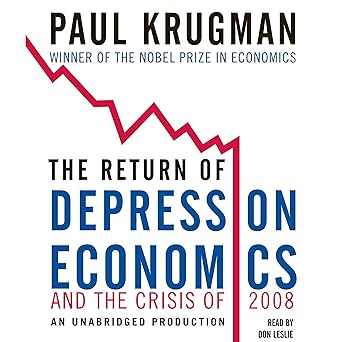
The economic landscape was once more a ticking time bomb, and it all started with a warning from the past. In the 1990s, a series of economic crises swept across Asia and Latin America, serving as a clear indicator that the Great Depression was a threat we couldn't ignore. Paul Krugman's book from that era, The Return of Depression Economics, highlighted the dangers of economic maladies that had become resistant to solutions, and it seemed like a prediction come to life. As the years went by, the world forgot about those crises, but the threat remained, and it finally re-emerged in the US when the housing bubble burst in the mid-2000s. The US financial system turned out to be just as vulnerable as those of developing countries that had faced similar crises earlier. What's alarming is how the failure of regulation to keep up with the increasingly reckless financial system put the entire world at risk, making a repeat of the 1930s a very likely scenario. In this updated edition, Krugman shows how the lack of regulation and oversight led us to the brink of disaster and outlines the necessary steps to take to prevent further damage, and to bring the economy back on track, laying the groundwork for a renewed debate over how to navigate this critical juncture.
Discover this book on Amazon (affiliate link)
The Financial Crisis Inquiry Report, Authorized Edition: Final Report of the National Commission on the Causes of the Financial and Economic Crisis in the United States
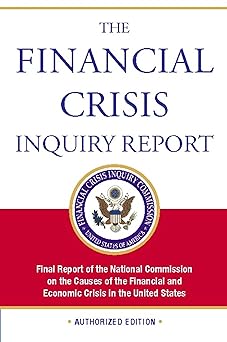
The Financial Crisis Inquiry Report is a comprehensive and accessible account of the events that led to America's economic meltdown. I still remember the conversations I had with friends and family members who lost their jobs and struggled to make ends meet during those difficult times. Many of them were left with a sense of uncertainty and frustration, wondering how such a catastrophic event could have occurred in the first place. This report, written by a panel of 10 commissioners with diverse backgrounds and expertise, provides a detailed and unbiased account of what happened, who was responsible, and why it happened. The FCIC had the power to subpoena documents and interview key figures, giving them access to millions of pages of evidence that no reporter had previously seen. The report is written in a clear and concise manner, making it easy for readers to understand the complexities of the crisis. It includes a glossary, charts, and diagrams to help illustrate key concepts, as well as a timeline of important events. What's most striking is how the report sheds light on the interconnectedness of the financial system and the regulatory failures that contributed to the crisis. It's a sobering reminder of the importance of prudent regulation and oversight, and a valuable resource for anyone looking to understand the causes of the financial crisis.
Discover this book on Amazon (affiliate link)
Economic Crisis, International Tourism Decline And Its Impact On The Poor
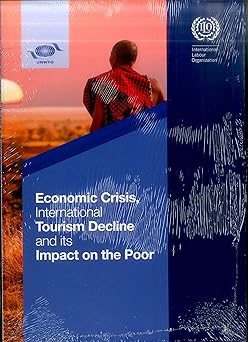
The global economic crisis of 2009 had a profound impact on international tourism, leading to a significant decline in international tourist arrivals and revenues. This decrease in demand had far-reaching consequences for poor and vulnerable groups, who rely heavily on tourism as a source of employment and income. Many individuals and families, who were already living on the margins, found themselves struggling to cope with the sudden loss of their livelihoods. In some cases, the decline in tourism led to a decline in the capacity of households to adapt to new economic realities. For example, in countries where tourism is a significant source of foreign exchange earnings, the decline in tourism led to a decline in government revenue, which had a ripple effect on the overall economy. In the Maldives, for instance, the decline in tourism led to widespread job losses and a decline in the country's GDP. In other countries, the decline in tourism led to a decline in the capacity of households to invest in their children's education and health. The study highlights the need for policymakers to consider the impact of economic shocks on vulnerable groups, who are often the most affected by such crises.
Discover this book on Amazon (affiliate link)
Contention in Times of Crisis: Recession and Political Protest in Thirty European Countries
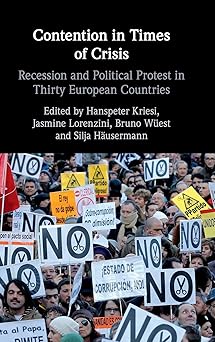
The Great Recession sent shockwaves across Europe, and the subsequent waves of protest that swept across the continent were a direct response to the economic hardship and political instability that followed. The protests that erupted in thirty European countries were a complex phenomenon, driven by a mix of economic and political grievances. The authors of this comprehensive overview of the protests in Europe documented the extent of the mobilization, exploring the issues that protesters addressed and the degree to which the protests replicated each other across different countries. What's fascinating is how the authors challenged some of the existing claims about the drivers of protest, arguing that anti-austerity sentiments were not the sole catalyst for the mobilization, and that political grievances played a significant role. The study also reveals a surprising connection between the electoral and protest arenas – it turns out that protest mobilization had a significant impact on electoral outcomes, essentially punishing politicians who were seen to be out of touch with the concerns of voters. This book is a valuable contribution to our understanding of both the economic and political factors that drive protest, and it offers a nuanced perspective on the complex relationships between economic hardship, political instability, and collective action.
Discover this book on Amazon (affiliate link)
Crash Proof 2.0: How to Profit From the Economic Collapse
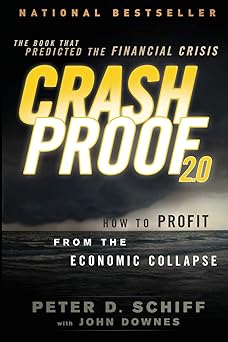
I still remember the day I first heard about the economic collapse from one of my clients who had been following Peter Schiff's work for years. He was worried about his investments and was searching for a way to protect his savings. As I listened to his concerns, I couldn't help but think about how much we all need to be prepared for the unexpected. That's why I was excited to dive into Peter Schiff's latest book, Crash Proof 2.0, which promises to deliver a comprehensive guide to navigating the economic storm that's already begun. In this book, Schiff takes a very clear and straightforward approach, warning that the economy is a house of cards on the verge of collapse and providing a clear three-step plan to help you protect yourself and even profit from the downturn. He explains the factors that will affect your future financial stability, from growing federal, personal, and corporate debt to a declining dollar, and offers expert advice on how to preserve your wealth and protect the purchasing power of your savings. What I found most impressive about this book is Schiff's ability to break down complex economic concepts into easy-to-understand language, making it accessible to anyone who wants to take control of their financial future. Through the book's insightful examination of the structural weaknesses underlying the economic meltdown, Schiff offers a unique perspective on how to survive and thrive during the coming years of economic uncertainty. With its in-depth insights and expert advice, Crash Proof 2.0 is a must-read for anyone who wants to be prepared for the unexpected and ensure their financial stability in the face of economic adversity.
Discover this book on Amazon (affiliate link)